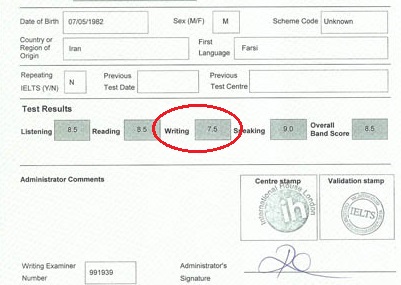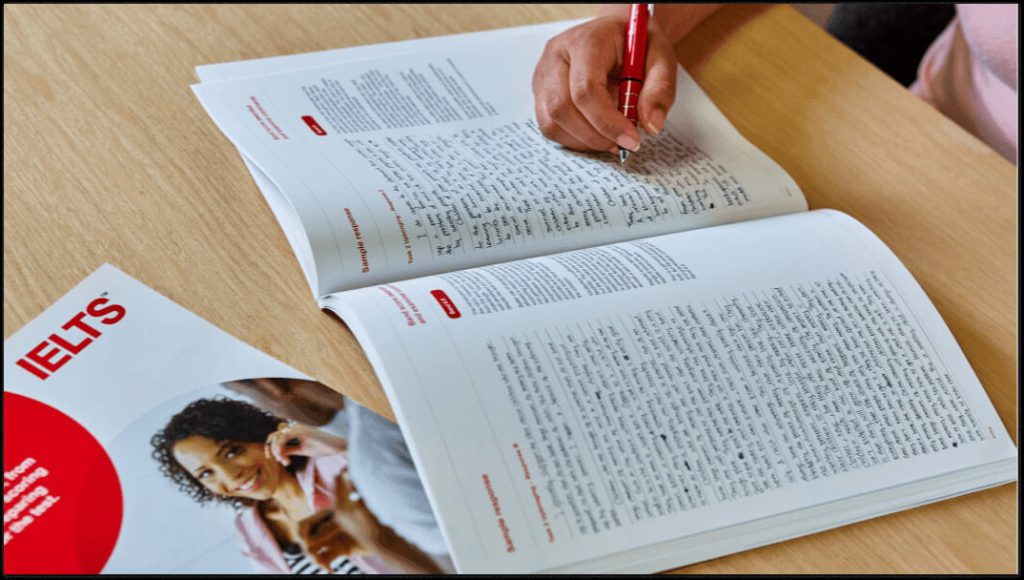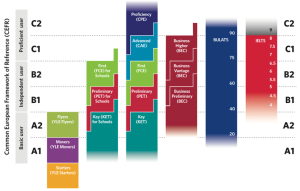Many candidates leave the test center thoroughly happy about using a reversed conditional sentence and “not only, but also” as well as using the words “miscellaneous” and “conundrum” in the writing part of the test and are confident that they will score 7 for Writing. But this shows their naivete. It would be too simplistic to think fancy words and complex grammatical structures are the keys to achieving band 7.
Writing Band 7: Why so Challenging?

For many IELTS candidates achieving Writing band 7 is a dream never come true. But what are the reasons?
First, let’s take a look at some surprising statistics. The table below is taken from www.ielts.org and is valid.
As can be seen, the average writing score for native test-takers (Australian, New Zealanders, etc.) is 6.2. This statistic highlights the fact that:
IELTS test is not only about vocabulary and grammar
Even if you sit a test similar to IELTS in your first language, you will probably fail to score high in the writing part. Achieving success in the writing part of the test needs writing skills, and these skills are not only about the knowledge of vocabulary and grammar. In other words, the test is designed to evaluate something more than your English proficiency.
But what things are tested in the Writing Part of the test?
The IELTS examiner uses a reference known as “The Band Descriptors” to determine your score. Your response is evaluated according to four criteria, which are
- Task Response
- Cohesion and Coherence
- Lexical Range and Accuracy
- Grammatical Range and Accuracy
The first two criteria are not about your language proficiency. Also, they are the reasons why even natives fail to score high on the test.
Now, how can we score high on the test?
To begin with, to achieve band 7, we have to answer the questions properly to earn a good score in terms of Task Response. That is, to provide a well-developed answer covering different aspects of the question (particularly Task II question). But that is not easy at all. To do so, we need to read the task II question carefully and come up with relevant and reasonable ideas. Doing this is not about how good we are at the English language, but how well-versed we are and if we can critically think about the question in the test. So, ideas and how well-supported they are is important and can make a huge difference. Take a look at the certificate below:
The test taker has managed to score 8.5 overall, but in terms of Writing, the score is 7.5. The participant claimed that he read the question in haste and didn’t properly think about it. Thus, he ended up with a 7.5. His scores in the four Wiring criteria were probably as follows:
- Task Response: 5
Cohesion and Coherence: 8
Lexical Range and Accuracy: 9
Grammatical Range and Accuracy: 9
Failing to understand the question and providing an off-topic response leads to a band 5 in terms of Task Response, which has nothing to do with Lexical Resource and Grammar.
The second thing that we should consider is Cohesion and Coherence criterion. It evaluates your writing performance in terms of integrity and organization. The better you organize your ideas and your essay, the higher you score for this criterion. Therefore, you should always think about how you want to give your opinions and what your strategy is to prove your point. For instance, it is always recommended that writers first reply to a question and then go forward and explain and give reasons. If they opt for the opposite, the readers are likely to get confused. The last thing that a good writer wants is to confuse the readers. Also, since this Cohesion and Coherence aims for directness and clarity, it negates the use of fixed phrases that are lengthy and can be replaced by much simpler terms. For example:
- As can be seen, the given data shows that wheat was produced in much greater amounts in comparison with corn.
- Data shows that wheat production was much larger than corn.
Cohesion and Coherence focus on straightforwardness and clarity. Hence, sentence B is the better alternative. Generally, a better writer uses fewer words to express and explain his idea. Language is for communication, and those who make it unnecessarily complex are not considered good users. In a nutshell, Cohesion and Coherence are there to evaluate how successful the candidate is in making it easy for the reader to follow and understand the given thoughts and ideas in the essay. The easier and clearer your ideas are provided, the higher score you can get.

About Lexical Resource and Grammar
So, what remains are Lexical Resource and Grammatical Range and Accuracy. These two things are tools for us, as writers, to express our thoughts. Candidates should do their best to use vocabulary and grammar to reach clarity, conciseness, and precision in expressing their ideas. Therefore, a writer should know why they prefer “dilemma” over “hardship” and “difficulty.” If the reason is only that “dilemma” is a C2 level vocabulary, but the other two are a B2 level, then this choice of word is not justified, and the writer might end up getting a lower score rather than a higher one. The same goes for grammar. Using grammar with precision and error-free should be the primary concern of test-takers.
To put it simply, achieving band 7 and higher in terms of vocabulary and grammar is dependent on making no serious mistakes. Consequently, candidates should concentrate on reducing their errors rather than using sophisticated words and grammatical structures.









